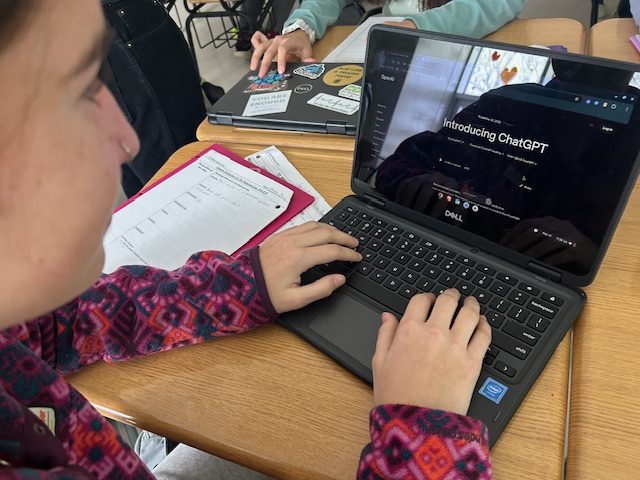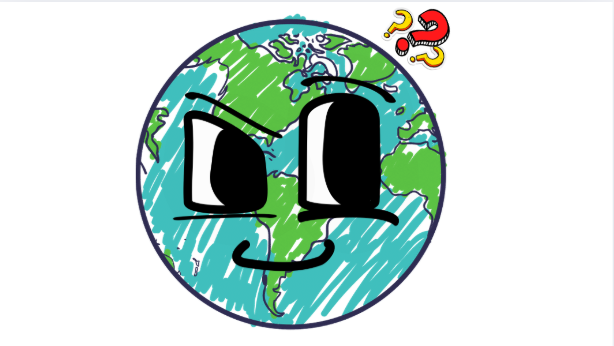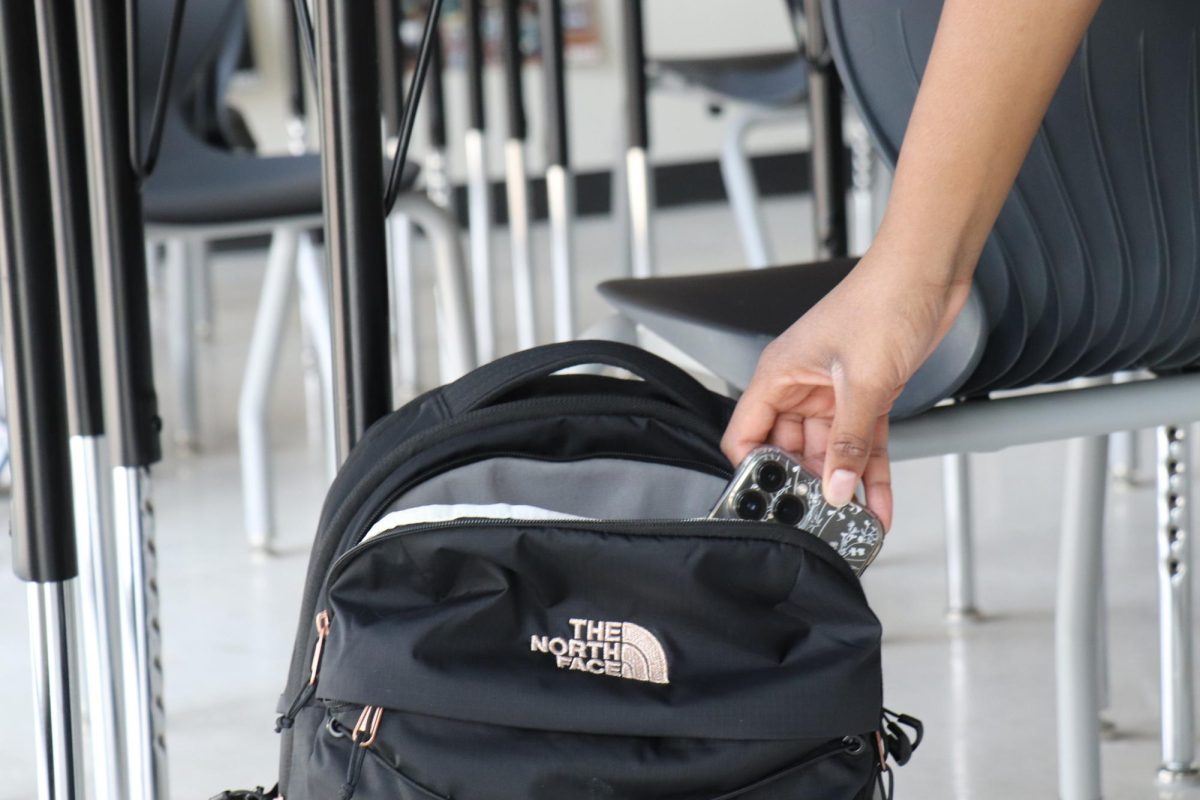Imagine. You have your entire life figured out. You have friends. You have a family. You have a home. Then you get in a car. You pack all of your belongings. You drive to the airport. The car is silent. Your dad and brother are still at home. You go through security. You board the plane. The plane takes off. Big. Loud. You watch your whole life stay put. Whilst you fly away. How would you handle moving across the world and leaving everything you loved behind? Alisa Zhou ‘27 shares her ups and downs with moving across the world.
Most people enjoy doing things like sports, clubs, and personal hobbies after school. Zhou is no different. She enjoys foods like hotpot, pizza, spicy tofu and barbecue. “Burgers in China [are] not very but in America, oh, very good. Try Chinese food but not the burgers.” And like many other kids, she loves playing Minecraft for fun.
After school in China Zhou would read love stories and skateboard. “When I was in China I liked skating and playing with my friends on the weekends. But I can’t skate very well. I always fall down.”
With over 280 million followers on X, formerly known as Twitter, Taylor Swift is one of the biggest songwriters currently. Zhou can definitely relate to this and she is somewhat of a swiftie (Taylor Swift fan) herself. “My favorite English song is Love Story.”
It hasn’t been all fun and games for Zhou though. Moving comes with its drawbacks as usual. For Zhou, she had to leave her brother and dad behind in China (and all the good food) while she and her mom moved to Iowa. A lot of kids who move have to learn to deal with the constant missing of their friends. Zhou has experienced the same because she had to leave all of her friends behind in China and make new friends while balancing learning English.
Zhou expresses that even though not all of her friends were in China she still misses them a bunch. “I very [much] miss my friends. Some of my friends were in Singapore, but most of them were still in China.”
Despite her moving, her friends seem determined to make it exciting. “They said, when I come back to China they will let me eat lots of things. I very much miss Chinese food.”
When Zhou moved, her brother and dad stayed behind in China. But despite having a busy schedule, Zhou finds time to connect and call her dad.
Her relationship with her brother on the other hand… “No, I don’t miss him. I seldom text him.” But that’s not all. “He only texts me if he needs money. Before coming to America I gave him all of my money ‘cause he said, ‘I’m so poor. I want to have good things to eat. Can you give me all your money?’”
With China using the yuan, Zhou said that she couldn’t use her money here. Even if she could, the exchange rates are currently so low (.14 USD for one yuan) she decided to be a good sibling and give her brother all of her yuan. Not without regrets though. “I want to get my money back.” Zhou said.
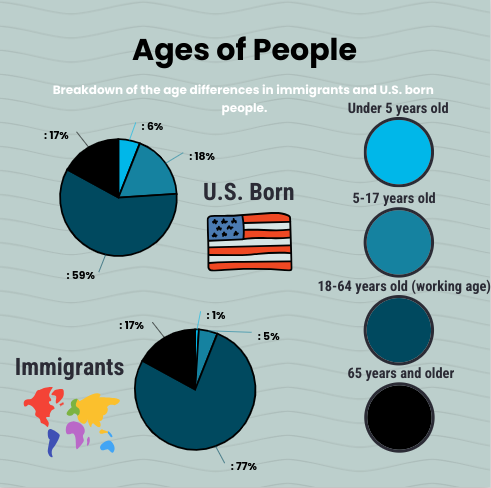
This chart shows the amount of people who are born in the United States and how many people were born in another country and immigrated to the United States.
Zhou moved to Iowa City because she didn’t have citizenship in China. Being born in the United States and moving to China when she was four meant that she didn’t have citizenship. China requires you to be a citizen to take high school. Her brother, being a high school student during 2020, was allowed to study at one of China’s international schools in order to stay safe. Zhou was less lucky and had to move to the U.S., where she has citizenship, to start and finish high school.
“We have three years in junior high. It’s seventh, eighth, and ninth. So I am still in ninth grade now because my credit can’t translate here,” Zhou says. This causes Zhou to be older than most kids in ninth grade are. “I’m 16. [I’m] near 17 because February is my birthday [month].”
Zhou states that her most difficult subject is English 9 because of how hard it is. There are lots of grammar rules and lots of rules that have so many exceptions. She has been learning English for the past nine months. While nine months is a long time, she still needs to translate most of her assignments. Having to translate non-English 9 assignments is a lot easier. But having to translate entire pieces of Shakespeare? Not as easy as one would think.
“Everything in English nine is very hard to do, because I write a lot of things and I just need the translator.” Zhou repeats frustratedly. Spanish teacher Señora Sandhu states that kids are very much so inclined to go to the internet for a translator during Spanish Class.
While most students would like to use a translator for their assignments according to Spanish teacher Señora Sandhu, there are some downsides to using a translator, Zhou says. “When I use the translator there are lots of things that don’t match the article [when translating].”
English is a hard language, but for Zhou there was one positive. “It’s a lot easier to write out letters than characters,” she said. Zhou states that it is a lot easier to memorize how the letters sound and how they look. With characters she had to memorize each one. “I learn it for almost nine years but I still can’t remember. There are so many words that I don’t know,” she said.
With most colleges requiring two years of foreign language to be accepted (French or Spanish), everyone gets their own shot at learning a new language. Zhou is no different. Alongside learning English, she is currently taking Spanish one with Megan Bohme.
For Zhou, learning Spanish has come with some difficulties. “When I am learning Spanish I think, what’s this? Why pronounce like this?” But the story doesn’t end there. “When I am learning English I think, ‘Wow! There are so many words. I can’t remember them all.’” Another thing that not many people think about is, “Spanish is difficult to me because I can’t [roll my Rs]. I can’t do that. I can’t pronounce the words correctly.”
Not everything in the United States is harder or worse though. Zhou expresses that there are many things that Iowa has that China does not have.
76% of all countries have religious freedom written into their constitution, however, only 64 countries actually respect what that means. With this in mind, it is not surprising that, “There are churches in Iowa, but I never see churches in China,” Zhou says.
Most students feel as though West high school is too strict about phones, but at least students are allowed to bring their phones. According to Zhou, “Our school had lots of rules. We can’t take our phones to school and we don’t change our classes, we just stay in one class and our teacher comes to us.”
Teachers and churches aren’t the only differences. School in the U.S. is quite different from China. For Zhou, her school day was 12 hours long. Her school also only had two terms instead of three trimesters. While two weeks for winter break is customary for us, in China they don’t celebrate Christmas. And while Iowa City students get a week of spring break, Zhou was left with more school.
“There are only two months for summer break in China.” When Zhou found out we have three months for summer break her response was, “I am happy!”
As well as a shorter summer, there is no spring break and, “There are only two terms. We begin school September first to February first and we begin again in march,” Zhou shared. Having an entire month off for school sounds nice, but its trade off is, “We don’t have Christmas holiday in China. Only international schools have it.”
While China is known for their wonderful landscapes and mountains, the U.S. has some places that can rival China’s landscapes. For Zhou, she expressed a strong liking for Chicago. For her she quite likes going on the boats and walking around downtown. From the world’s largest Starbucks to a Nike store, Chicago itself has lots to offer and is a diverse place.
While traveling in the U.S. is very enticing, with all its different landscapes, Zhou’s family used to do something a little bit different. “It’s just a river between China and Russia and now we don’t need a green card to go to Russia. We can just cross the river and go to Russia and take some food.” Zhou reminisces.
In Iowa, Iowans are used to the random fluctuations of weather. Iowans are no stranger to it being 50 degrees fahrenheit one day and then negative 10 the next day. China is not too different. China’s 34 provinces are spread all over the country, meaning there will be different temperatures everywhere (with China being roughly the size of the U.S.). It is a lot warmer near the equator than it is near Russia. In response to all the snow Iowa recently got, Zhou says, “I have never seen such heavy snow in my city before.”
2020 was a stressful year for everyone. There was so much going on that there’s no way to even list it all. Living right where the pandemic all started though, that’s pretty scary. This is how Zhou handled it. “No one near me died. Everyone stayed safe near me.” That all sounds pretty good and not so bad, but, “I was infected three times,” Zhou states. “But at the time the disease was not very strong so I just got a fever.”
Looking to the future, Zhou has many plans and ideas of what to do once her English has been solidified. With her brother and dad coming to the U.S. around next year, she hopes to travel with her family and learn more about her interests. She would like to learn guitar in the coming years. She also hopes to learn more English from reading many books.
For Zhou, “Life in the coming years may be normal. Just like graduating from high school and going to college.” Even after graduating high school, 37% of alumni don’t know what they want to do with their life. So in typical high school fashion, “After that I think I will find a job in the U.S. Even though I haven’t figured out what I am going to do in the future.”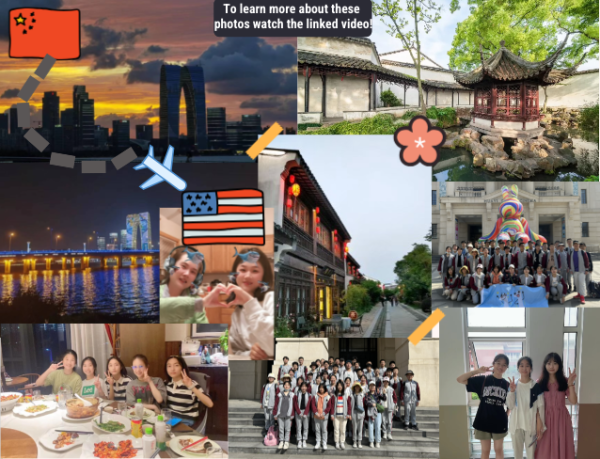
These photos are from different times in Zhou’s life. Click on the video to learn more. Photos were taken by Zhou’s friends and family.





